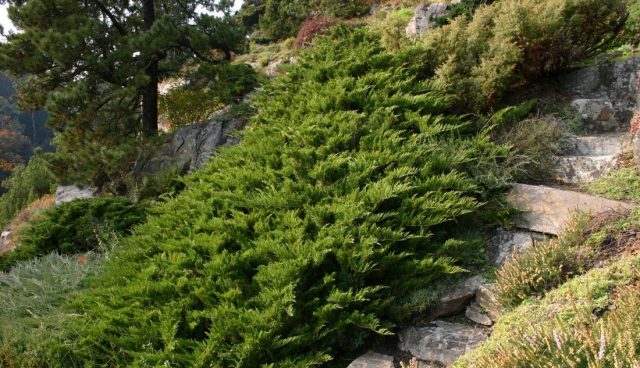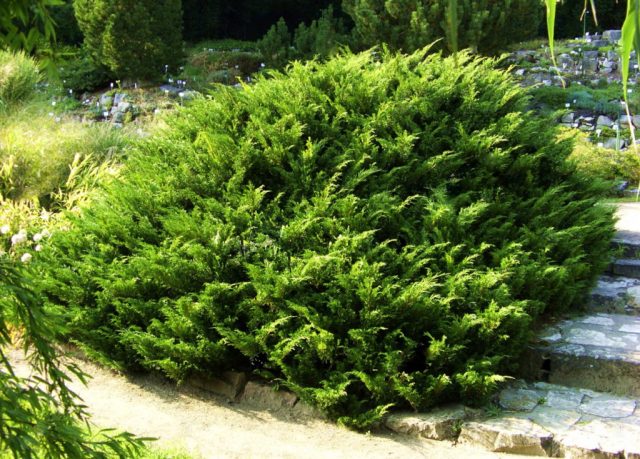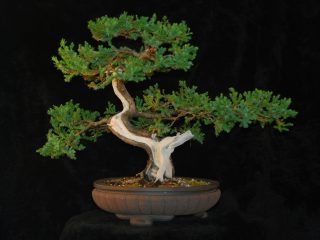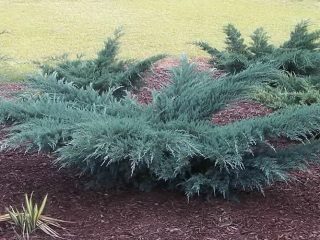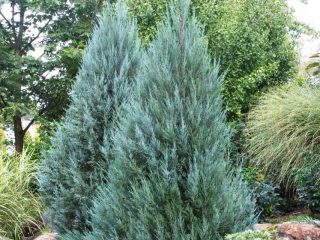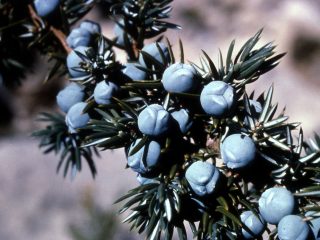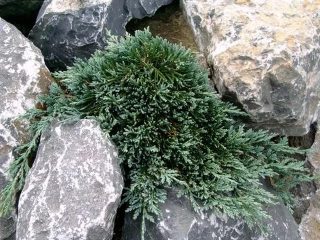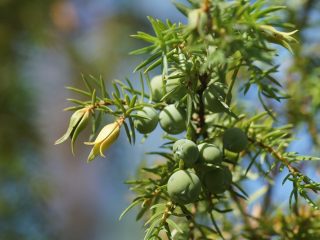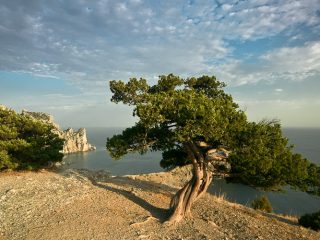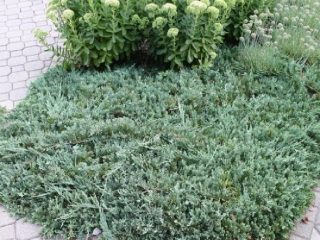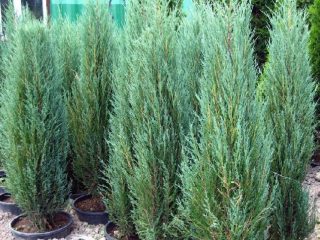Content
Juniper Tamariscifolia is a perennial coniferous plant. This variety tolerates any weather conditions well and can withstand low temperatures down to -30°C. Today, Cossack Tamariscifolia is the most popular species used to decorate gardens. In order to grow an attractive decorative juniper, you need to know how to properly care for it after planting it in open ground.
Description of juniper Tamariscifolia
Considering the description of the Cossack juniper Tamariscifolia, it is worth noting that it grows rather slowly. As practice shows, the annual growth does not exceed 3 cm in height and about 10-15 cm in width. When Tamariscifolia reaches the age of 10 years, it has a height of 30 cm and a diameter of up to 2 m.
The needles are needle-shaped, small, pointed at the ends. The color can vary from light green to bluish green.The cones are round in shape, their size is 0.5-0.7 cm. At first the cones are green, gradually they become dark blue with a characteristic bluish tint.
Cossack Tamariscifolia is unpretentious in care and grows well on both rocky and sandy soils. Tamariscifolia tolerates severe droughts, but may die if the soil is swampy.
Juniper Tamariscifolia in garden design
The juniper Tamariscifolia is often called horizontal, since it does not grow upward, but in width, forming a cushion of sharp needles. Such plants are mainly planted in gardens, flower beds, lawns, and used as a decorative element. With the help of juniper you can zone a plot of land.
This variety is great for creating a hedge or border. As practice shows, Cossack juniper Tamariscifolia goes well with other plant species. Many gardeners consider the main advantage to be beautiful needles, which come in different shapes and shades. This variety can delight you with its appearance for many years only if you provide high-quality care.
Planting and caring for Cossack juniper Tamariscifolia
Judging by the characteristics, reviews and photos, the Cossack juniper Tamariscifolia loves to grow in sunny areas. Depending on the size of the planting material, the distance between plantings can vary from 0.5 m to 2 m.When digging a hole, it is worth considering that for small bushes the depth should be several times greater than the earthen ball; for an adult juniper it is 70 cm.
During the care process, do not forget about watering, which should be moderate. Do not allow the soil to dry out or become waterlogged. Fertilizers are applied annually - several times throughout the season.
Preparation of seedlings and planting area
Before planting juniper, it is recommended to first select and prepare a place for planting. The place should be on a hill. This is necessary so that the root system does not come into contact with groundwater.
If the seedlings have an open root system, then they must be planted in open ground in early autumn. In this case, special attention should be paid to the roots - they should not be dry or show signs of rot.
Before planting planting material in open ground, it is necessary to place the roots of the seedlings in warm water for 3-4 hours. After which the roots are treated with a rooting agent. If necessary, the drug can be added to the water in which the seedlings are soaked.
Rules for planting Cossack juniper Tamariscifolia
Juniperus variety Tamariscifolia can grow on any soil - saline, sandy, neutral, slightly acidic. For planting, it is recommended to choose a place that is in partial shade.
The work algorithm looks like this:
- The first step is to dig a hole, the dimensions of which are: depth - 60 cm, width - 60 cm.
- A layer up to 10 cm high of expanded clay or broken building bricks is poured into the bottom of the pit.
- A layer of a mixture of peat, turf and sand is poured on top.
If you plan to create a border from the bushes, then during the planting process it is necessary to make a distance of 50 cm between the bushes. For a single planting, there should be free space around the juniper within a radius of 2 m.
Watering and fertilizing
Juniper Tamariscifolia needs abundant watering for the first 1-2 weeks after this variety was planted in open ground. As the plant grows, it tolerates rainy weather well, but it is important to understand that growth is impossible in wetlands. During the season, watering is carried out up to 3 times.
Mineral fertilizers are used as top dressing in the spring. At the end of April or at the beginning of May they begin to use Kemira-Lux. To do this, you need to add 20 g of the drug to 10 liters of water and pour the contents onto one bush.
Mulching and loosening
It is important not only to choose the right planting material, but also to provide it with suitable conditions after planting in open ground.
In order for the root system to receive the required amount of oxygen, loosening must be carried out in a timely manner. After the weeds have been removed under the Cossack juniper variety Tamariscifolia and the soil has been watered, it is necessary to loosen the soil.
The soil is mulched after the planting material has been planted in a permanent place of growth. In this case, it is recommended to use peat or soil. The mulch layer is about 3-5 cm.
Trimming and shaping
Since juniper grows very slowly, pruning is not required often, but shortening is necessary, as a result of which the juniper will not have an unkempt appearance. In addition, the plant will not fill all the available space around itself.
This procedure is usually carried out annually. If you trim the branches correctly, no harm will be done to the plant. In this case, you need to pinch off the ends of the bush, thereby creating a shape. In addition, you can direct the needles to grow in the desired direction. If necessary, you can give it any shape.
Preparing for winter
According to the photo and description, juniper Tamariscifolia is able to grow in regions with temperatures down to -30°C, as a result of which it is not necessary to cover the bushes for the winter. Before sending the juniper for the winter, it must be prepared. In this case, it is recommended to insulate the soil around the plantings, remove diseased and damaged bushes, and do formative pruning. The cut areas must be treated with alcohol and resin. If necessary, the juniper Tamariscifolia can be covered with spruce branches.
Reproduction of Cossack juniper Tamariscifolia
Considering the description, reviews and characteristics of the Cossack juniper Tamariscifolia, we can say that propagation is carried out in three ways:
- cuttings;
- seeds;
- layering.
The most effective method of propagation is cuttings. As practice shows, cuttings taken from a perennial bush take root much faster. After rooting, up to 2 years should pass, after which the planting material can be planted in open ground.
Propagation by seeds is the most difficult and time-consuming method, which is used only by professional gardeners.
Diseases and pests
Cossack juniper Tamariscifolia, like many plant species, is subject to the appearance of pests and diseases during the growth process. At the beginning of spring, when the sun is shining brightly, there is a chance of getting sunburn. As a result, the needles turn yellow and fall off. In this case, it is recommended to cover the juniper from direct sunlight in the first half of March, insulate the ground and use warm water during watering.
In addition, the crown may begin to turn yellow if the plant has been affected by a fungus. This type of disease can destroy a plant in 2-2.5 years. It is possible to defeat the disease. To do this, you need to cut off the diseased parts and treat the cut areas with alcohol.
Conclusion
Juniper Tamariscifolia, due to its decorative and attractive appearance, is very popular among landscape designers. This variety is excellent for creating a hedge. In addition, the plants are unpretentious in care.
